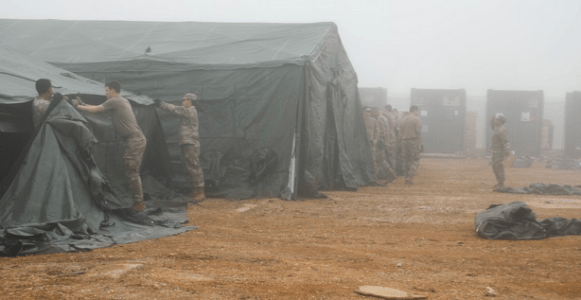
Afghan nationals housed at military base in Kosovo risk being denied entry to US for having terrorist ties
Some countries have agreed to take anyone banned from the US and send them back to Afghanistan, where they may be harmed, in violation of international law.
It presents a legal, humanitarian and diplomatic puzzle for the Biden administration after a chaotic evacuation effort last summer. Thousands escaped from Kabul airport with little, if any, lives, while more than 60,000 former interpreters and other visa applicants were left behind.
Most of the more than 100,000 Afghans aboard evacuation flights made their first stops at US military bases overseas for preliminary security checks after the US withdrew its troops and captured the Taliban in August. Around 200 of them, some of whom are family members of individuals who are undergoing additional investigation, were brought to Bondsteel for further investigation after questions were raised about their background.
Afghans held at the Kosovo camp described the difficult conditions in which families with infants and young children have spent months in shared tents, with little information about the reasons for their halted travel, according to Simina Qureshi, a non-profit. Runs a for-profit organization that helps Afghan women. Ms. Kuorishi’s sister has been held in the camp for months along with her husband, a US military contractor and three young children.
Some of them once held high-profile positions in the Afghan government working with top US military leaders and diplomats, and among them a former intelligence-agency chief, a three-star Afghan general and a former National Security Council Spokespersons included.
US intelligence, counter-intelligence and defense personnel are conducting an expanded investigation of individuals in Bondsteel to determine if any of them can be approved to continue traveling to the US, as some have already done. Is.
Julie Sirs, a lawyer helping the former Afghan intelligence-agency chief held in Kosovo with her family, said the administration needed to allocate more resources to expedite the processing of cases. Ms. Siers met with the head of the intelligence agency while working on intelligence in Afghanistan and she doesn’t know why she is being held.
“He was one of our strongest allies,” she said. “They helped us a lot during the first period when we entered Afghanistan.”
US officials said individuals at Bondsteel are now technically free to opt out or opt out of the application process to enter the US, but there must be another country that agrees to take them. At least one such person has successfully done so.
Seth Jones, a senior fellow at the Center for Strategic and International Studies in Washington, said the US is attempting to balance the security of the American homeland with the well-being of the people it helped evacuate from Kabul. He said the US should work through diplomatic channels to settle some individuals in other countries, but others could pose a real security risk.
US officials declined to say what information they have about individuals banned from the US, but it could include biometric data, such as fingerprints, that were captured on American or Coalition soldiers during the 20-year conflict. attacks or other disturbances. Biographical data that links a person to a terrorist group, Mr Jones said.
Officials said there were no major terrorists in Bondsteel, but declined to provide further details about who was being held there.
“The fact that analysts and experts want to continue working and understand their cases suggests to me that these cases are complex and they deserve further investigation,” the senior administration official said.
Among them is a former Taliban commander who was jailed for two years in a US-run prison in Bagram. The commander, who asked not to be named for security reasons, later switched sides in 2020 to become a spokesman for the Afghan National Security Council. This has made him a top target of the Taliban, he said.
“Everybody knows who I am,” he said. “The Taliban will kill me and then deny any knowledge of the murder.”
Source: Business Hala





